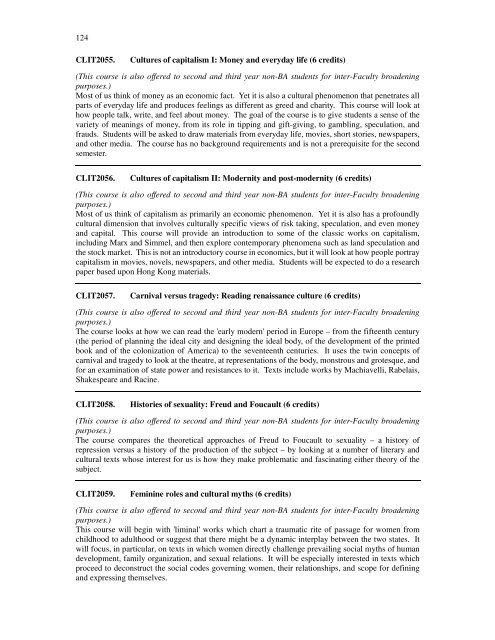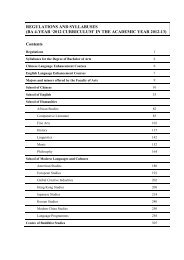Bachelor of Arts (BA) - The University of Hong Kong
Bachelor of Arts (BA) - The University of Hong Kong
Bachelor of Arts (BA) - The University of Hong Kong
Create successful ePaper yourself
Turn your PDF publications into a flip-book with our unique Google optimized e-Paper software.
124CLIT2055.Cultures <strong>of</strong> capitalism I: Money and everyday life (6 credits)(This course is also <strong>of</strong>fered to second and third year non-<strong>BA</strong> students for inter-Faculty broadeningpurposes.)Most <strong>of</strong> us think <strong>of</strong> money as an economic fact. Yet it is also a cultural phenomenon that penetrates allparts <strong>of</strong> everyday life and produces feelings as different as greed and charity. This course will look athow people talk, write, and feel about money. <strong>The</strong> goal <strong>of</strong> the course is to give students a sense <strong>of</strong> thevariety <strong>of</strong> meanings <strong>of</strong> money, from its role in tipping and gift-giving, to gambling, speculation, andfrauds. Students will be asked to draw materials from everyday life, movies, short stories, newspapers,and other media. <strong>The</strong> course has no background requirements and is not a prerequisite for the secondsemester.CLIT2056.Cultures <strong>of</strong> capitalism II: Modernity and post-modernity (6 credits)(This course is also <strong>of</strong>fered to second and third year non-<strong>BA</strong> students for inter-Faculty broadeningpurposes.)Most <strong>of</strong> us think <strong>of</strong> capitalism as primarily an economic phenomenon. Yet it is also has a pr<strong>of</strong>oundlycultural dimension that involves culturally specific views <strong>of</strong> risk taking, speculation, and even moneyand capital. This course will provide an introduction to some <strong>of</strong> the classic works on capitalism,including Marx and Simmel, and then explore contemporary phenomena such as land speculation andthe stock market. This is not an introductory course in economics, but it will look at how people portraycapitalism in movies, novels, newspapers, and other media. Students will be expected to do a researchpaper based upon <strong>Hong</strong> <strong>Kong</strong> materials.CLIT2057.Carnival versus tragedy: Reading renaissance culture (6 credits)(This course is also <strong>of</strong>fered to second and third year non-<strong>BA</strong> students for inter-Faculty broadeningpurposes.)<strong>The</strong> course looks at how we can read the 'early modern' period in Europe – from the fifteenth century(the period <strong>of</strong> planning the ideal city and designing the ideal body, <strong>of</strong> the development <strong>of</strong> the printedbook and <strong>of</strong> the colonization <strong>of</strong> America) to the seventeenth centuries. It uses the twin concepts <strong>of</strong>carnival and tragedy to look at the theatre, at representations <strong>of</strong> the body, monstrous and grotesque, andfor an examination <strong>of</strong> state power and resistances to it. Texts include works by Machiavelli, Rabelais,Shakespeare and Racine.CLIT2058.Histories <strong>of</strong> sexuality: Freud and Foucault (6 credits)(This course is also <strong>of</strong>fered to second and third year non-<strong>BA</strong> students for inter-Faculty broadeningpurposes.)<strong>The</strong> course compares the theoretical approaches <strong>of</strong> Freud to Foucault to sexuality – a history <strong>of</strong>repression versus a history <strong>of</strong> the production <strong>of</strong> the subject – by looking at a number <strong>of</strong> literary andcultural texts whose interest for us is how they make problematic and fascinating either theory <strong>of</strong> thesubject.CLIT2059.Feminine roles and cultural myths (6 credits)(This course is also <strong>of</strong>fered to second and third year non-<strong>BA</strong> students for inter-Faculty broadeningpurposes.)This course will begin with 'liminal' works which chart a traumatic rite <strong>of</strong> passage for women fromchildhood to adulthood or suggest that there might be a dynamic interplay between the two states. Itwill focus, in particular, on texts in which women directly challenge prevailing social myths <strong>of</strong> humandevelopment, family organization, and sexual relations. It will be especially interested in texts whichproceed to deconstruct the social codes governing women, their relationships, and scope for definingand expressing themselves.
















